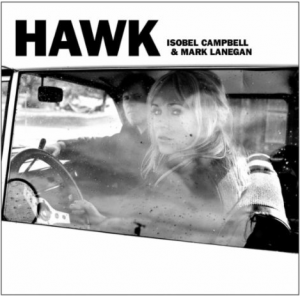Hawk

Mark Lanegan—hey, I know that name.
You sure do. Mark Lanegan fronted Screaming Trees, one of the better bands to come out of the early '90s Seattle grunge scene. They never gained the attention or commercial success of Pearl Jam, Soundgarden, or Nirvana, and their minor success was propelled mostly by “Nearly Lost You,” a track from the soundtrack for how-very-zeitgeisty film Singles. After grunge was discarded in favor of nu-metal, gangsta rap, boy bands, and factory pop, Mark Lanegan didn't remain with his old band churning out increasingly bad records or touring on nostalgia value. He joined Queens of the Stone Age, made music with Greg Dulli (of the Afghan Whigs) as the Twilight Singers and the Gutter Twins, and has released well-received solo records.
Isobel Campbell—that sounds pretty familiar, too.
Well, it should. Isobel Campbell was a member of indie darlings Belle and Sebastian from their inception in 1996 until her departure in 2002, as cellist, keyboardist, and backing vocals. She released two records under the name The Gentle Waves and has collaborated with Mark Lanegan for three albums, which is considered her breakout.
It's an odd pairing—the twee Scottish lass and the aging, rough-singing American troubadour, sounding here for all the world like a low-living Leonard Cohen. Campbell, who is credited with most of the songwriting and all of the producing and arranging, mostly sings backup or harmonizes with Lanegan throughout the record. She has a fine, serviceable, and lovely voice whose femininity works well with Lanegan's bluesy-grungy growl. Most of the record is a quiet hum, including a nice cover of Townes Van Zandt's “No Place To Fall,” but a New Orleans-style jazz/blues number (“Get Behind Me”) placed directly at track six cuts through the lull with all the subtlety of a brass band at an Ash Wednesday service.
Hawk is slightly uneven, but I don't find that to be a fault. It's a little piece of obscure southern-style Americana, with its jazz/blues/alt-country/gospel influences, and Isobel Campbell's voice is mellifluous enough to pass for any number of American female pop-rock singers pre-1980. I was fond of this record and it grew better and better with repeated spins.
Extremely well written with great terminology!
This is a right-on, well-written review. I have heard the recording and agree with the reviewer. BTW it's a nice change of pace to read a music review that isn't littered with cliches.